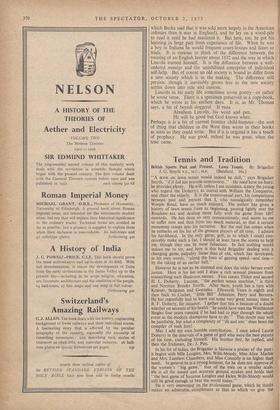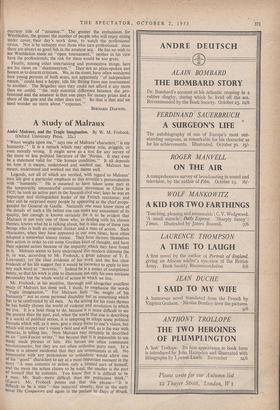Tennis and Tradition
British Sports Past and Present. Lawn Tennis. By Brigadier J. G. Smyth v.c., M.C., M.P. (Batsford. 16s.) "A BOOK on lawn tennis would indeed be dull," says Brigadier Smyth, "if it did not provide controversy." -He need'have no fears: he provides plenty. He will, unless I am mistaken, annoy the young who regard the Dohertys as coeval with William the Conqueror, and cheer the elderly. It is the controversial part, his comparisons between past and present that I, who nostalgically remember Worple Road, have so much enjoyed. The author has given a history of lawn tennis from its beginning, passing lightly over the Renshaw era and dealing more fully with the game from 1897 onwards. He has done so very conscientiously, and seems to me to suffer now and then from too much material, so that a certain monotony creeps into his narrative. But the real fun comes when he embarks on his list of the greatest players of all time. I admire his hardihood. In the only game, golf, as to which I could con- ceivably make such a list, I should at least have the scores to help me, though they can be most fallacious. In fact nothing would induce me to try, and here is this bold Brigadier dealing with a changing game, palpably faster than of old, which has developed, in his own words, "along the lines of gaining speed—and time— by the taking of an earlier ball."
However he is not ,to be daunted and does the older heroes every justice. Here is his list and I draw a rich sensual pleasure from transcribing such illustrious names. First comes Tilden and second H. L. Doherty. Lacoste, "the perfect tennis machine," is third and Norman Brooks fourth. After them, youth has a turn with Kramer, Sedgman and Gonzales. Ellsworth Vines is eighth and then back to Cochet, "little Bill" Johnston, Perry and Borotra. He has regretfully had to leave out some very great names; there is R. F. Doherty, for instance. I gather that this is because of a doubt whether on account of his health "he could have wen the Wimbledon Singles four years running if he had had to play through the whole event as the modern champions have to do." This doubt may well be justifiable, but what -a complexity of "ifs and ans" does beset the compiler of such lists! May I add my own humble contribution. I once asked Laurie Doherty in the intervals of a game of golf who were the best players of his time, excluding himself. His brother first, he replied, and then the Irishman, Dr. J. Pim.
In his list of ladies, the Brigadier is likewise a praiser of the past : it begins with Mlle Lenglen, Mrs. Wills-Moody, Miss Alice Marble and Mrs. Lambert Chambers, and Miss Connolly is no higher than tenth. In general he is a strong feminist, for he does not approve of the women's "big game," that of the men on a smaller scale. He is all for sound and accurate ground strokes and holds that "the best game of Suzanne Lenglen and Helen Wills-Moody would still be good enough to beat the world today." He is very interesting on the professional game, which he thinks makes an admirable, complement to that to which we give the courtesy title of "amateur." The greater the enthusiasm for Wimbledon, the greater the number of people who will enjoy sitting under cover, their day's work done, to watch .the professional circus. Nor is he unhappy over those who turn professional: since there are always as good fish in the amateur sea. He has no wish to see Wimbledon made an "open tournament," neither in his view have the professionals; the risk for them would be too great.
Finally, among other entertaining and provocative things, here are his views on "shamateurism." They are so plain-spoken and honest as to disarm criticism. We, in the street, have often wondered how young persons of both sexes, not apparently "of independent means," could lead a happy, idle life flitting from one tournament to another. The Brigadier says they could not afford it any more than we could; "the only essential difference between the pro- fessional and the amateur is that one plays for money prizes and a share of the gate and the other does not." So that is that and we need wonder no more about "expenses."
BERNARD DARWIN.



















































 Previous page
Previous page